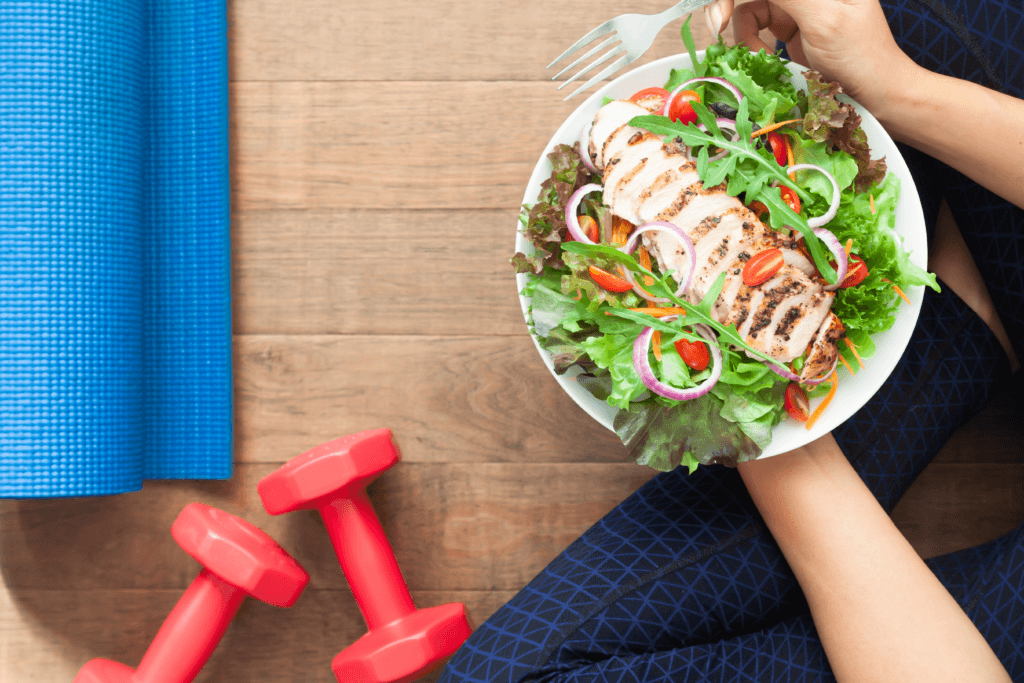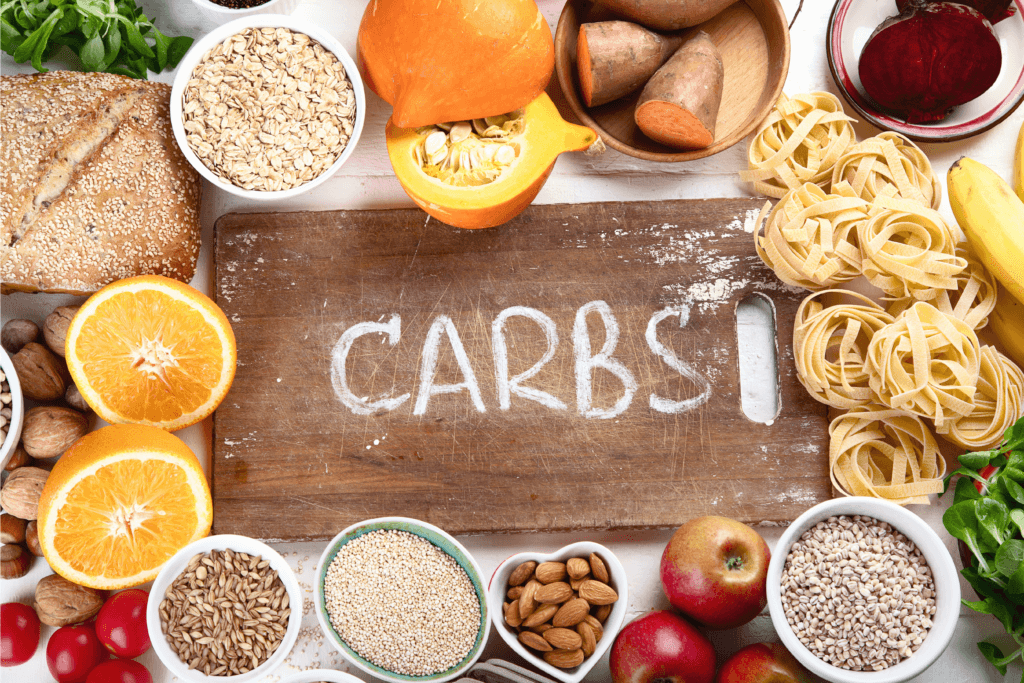Sports Nutrition 101
October 4, 2021

Sports nutrition is not just for competitive or pro athletes. No matter what sport you play or even just as someone who likes to exercise regularly, what you eat and how your fuel your body makes a difference in your overall performance and health. When fueling for exercise, we pay more attention to timing of meals and the nutrient composition of a meal or snack. Here we go over the basics of sports nutrition.
Overall Energy Intake
Athletes of all sports need enough calories to match their energy expenditure throughout the day and during activities. Without adequate energy intake, performance and overall health is compromised.
Energy needs vary depending on the level of physical activity. Athletes training for 2-6 hours per day, most days of the week may burn 600-1200 calories per hour while exercising.
The gold standard for calculating energy needs is doubly labeled water technique. However, this technique is expensive and not readily available to most individuals.
Instead, the Harris-Benedict equation is a simple and accurate formula that can help you determine your total daily energy expenditure.The Omni Calculator is a free online resource that walks through each portion of the equation.
This is one of the simplest equations and ways to estimate your overall calorie needs. Once you’ve determined your calorie needs, establish consistent meals and snacks.
Carbohydrate Needs for Athletes

Besides optimal energy intake, eating a balance of carbohydrates, fats, and protein can help optimize training and performance. Carbohydrates are an athlete’s friend, especially if you take part in an endurance sport, like long-distance running.
Sports nutrition research continues to suggest that when endurance athletes eat more carbohydrates, they are more efficient and faster. In 2014, a meta-analysis of 61 published studies showed that 82% of the studies showed higher carbohydrate intake is statistically significant with improved performance benefits and longer exercise times.
Ideally, most carbohydrates should come from whole grains, vegetables, and fruits. Click here to learn more about the benefits of whole grains.
Fuel Sources for Exercise
Our bodies use all three macronutrients for energy. Both carbohydrates and proteins provide 4 calories of energy for every 1 gram of nutrient consumed. Fat provides 9 calories per gram of fat.
Our body is very efficient at using carbohydrates for energy and is the most efficient fuel source for your brain and working muscles. There are advantages for using protein and fat in other cases, but neither outweighs carbohydrates with endurance training.
Your body either uses carbohydrates right away for energy or converts it into glycogen and stores it in the muscles and liver. Then, when you move your body and increase your energy needs, your body uses glycogen stores to produce continuous energy for working muscles.
Sports nutrition studies have shown that athletes who have higher amounts of glycogen in their muscles can run for longer. We also know that you have to replenish storage units with carbohydrates, as fats and proteins cannot contribute to glycogen stores.
Every person is unique with the exact amount of carbohydrates they need based on body weight and training levels. Calculate your needs either by grams of carbohydrate or calories of carbohydrates.
| Daily Carbohydrate Intake Recommendations | ||
| Amount of exercise | Grams CHO / pound of body weight | Calories of CHO / pound of body weight |
| Moderate exercise(~1 hour/day) | 2.5 – 3.0 | 10 – 12 |
| Endurance exercise(~1-3 hours/day) | 2.5 – 4.5 | 10 – 18 |
| Extreme exercise(~4-5 hours/day) | 3.5 – 5.5 | 14 – 22 |
Meal Timing

Despite all the research, ideal meal timing for you will require some trial and error. Each athlete responds slightly differently to types of foods. With that said, there are some general sports nutrition guidelines that can help you figure out the right meal and snack schedule.
Timing and food choices at meals can help reduce gastrointestinal concerns during training, reduce fatigue, and help support overall training goals.
Strength athletes may benefit the most from eating protein both before and after exercise. Endurance athletes may find they need mostly carbohydrates with a small amount of protein 1–4 hours before exercise.
Restoring glycogen stores is one of the primary goals after a workout session. The rate of glycogen resynthesis is about 5% per hour, it takes time to replenish used glycogen. It’s important to replenish within the first few hours. Check out our other blog post here to learn more about what to eat before and after a workout.
Hydration Needs for Athletes
Attention to hydration is important for all athletes. Excessive fluid loss can significantly impair performance and, if not corrected, can lead to serious health issues.
Thirst is not a good sign of when to drink because, at the point of being thirsty, you’ve already lost a significant amount of fluid and electrolytes. Instead, drink at specific times and athletes should practice drinking fluids during trainings to tolerate drinking water.
Adequate hydration includes a combination of fluids and electrolytes, including sodium, potassium, and magnesium.
Sweat contains varies amounts of sodium, potassium, calcium, and magnesium. Each of these electrolytes is also involved in nerve transmissions and muscle contractions.
Weighing yourself before and after exercise can help you fine tune your hydration habits. Weight loss of over 4% of your body weight during exercise can cause heat illness, heat exhaustion, heat stroke, or even lead to death.
You can also use your urine color to evaluate your hydration status, with more yellow tones showing a less hydrated state.
Remember that environmental factors, such as heat and humidity, affect fluid loss. But even in colder temperatures, athletes need to consume fluids with electrolytes.

General Hydration Guidelines:
Pre-exercise
- 2-3 hours prior exercise: 16-20 oz fluid
- 10 minutes prior exercise: 5-10 oz fluid
During-exercise
- Individualized to sweat rate
- Every 15-20 minutes: 5-10 oz fluid (Water and sports drinks after 1 hour of exercise and/or in boiling/humid conditions)
Post-exercise
- 16-24 oz fluid for every pound lost
Key Takeaways
Sports nutrition can play a big role in your overall athletic goals. Minor changes can make a big difference. All three macronutrients should be included on your plate during mealtimes and snacks. Yet, depending on your sport, you may need to adjust the proportion of each one. Along with food choices and meal timing, staying adequately hydrated helps athletes perform at their best. Sports nutrition emphasizes certain nutrients and timing to support training and competition performance.
Looking for some sports nutrition guidance? Click here to learn more about how our non-diet dietitians can help support you today!
[…] everything in sports nutrition , micronutrients needs vary based on the individual. It is best to work with a sports dietitian to […]
[…] FALSE by science, and needs to go. It is essential that female athletes need to eat enough food to fuel their body and their activity level. This can be difficult for some athletes to do especially if they are […]
[…] Fueling your body for sport is essential for sports performance and preservation of your overall health. Without adequate fuel, it becomes difficult to train, progress, and recover in sport. Not to mention, underfueling can lead to both short and long-term consequences to your health. […]
[…] are the most important nutrient before a workout to fuel our bodies. During a workout, simple carbohydrates are used within an […]
[…] “unnecessary” or “bad” even though this is not the case. Females without sports nutrition knowledge regarding the benefits of these nutrients will often shy away from sports drinks. As a […]
[…] with food. For example, coaches can have a sports dietitian speak with their team about sports nutrition. Dietitians can provide athletes with the right information about how to fuel their bodies and […]
[…] sports drinks an essential piece to a sports nutrition plan? We all know that hydration is important, especially if you are an active individual, but why […]